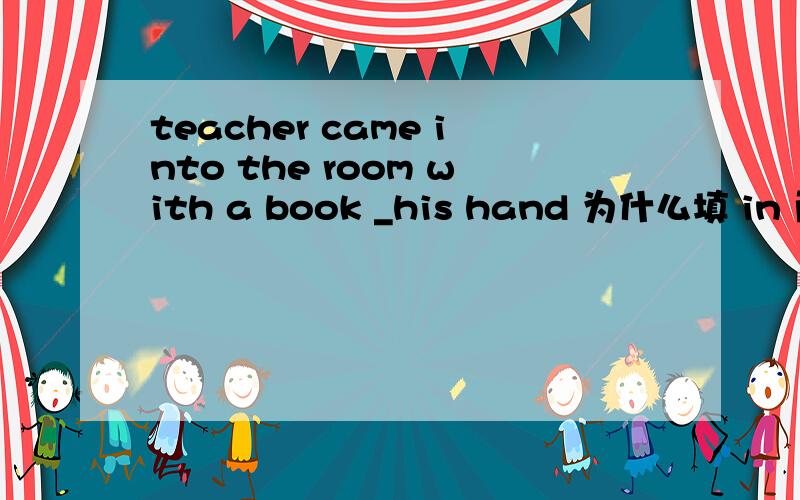teacher came into the room with a book _his hand 为什么填 in 而不是on
来源:学生作业帮助网 编辑:作业帮 时间:2024/11/27 04:38:21

teacher came into the room with a book _his hand 为什么填 in 而不是on
teacher came into the room with a book _his hand 为什么填 in 而不是on
teacher came into the room with a book _his hand 为什么填 in 而不是on
in 表示书在手中,手是握着书的一部分的.
on 则表示书在手的表面之上,手没有握着书,这不合常理.
学习是一件愉快的事! (*^__^*)
请及时采纳,多谢!
手里拿着肯定用in,而on是指与表面接触,书不能在手的表面吧,呵呵
希望能帮到你,祝更上一层楼O(∩_∩)O
有不会的欢迎再继续问我(*^__^*)
in one’s hand在某人手中
因为是手里拿着,有关手里拿着什么东西的都是in, 是固定搭配
还有,应该是the teacher, 或者a teacher, 前面应该有冠词。
书拿在手里用in 不仅是固定用法,也符合语法规则
一下是in和on的区别,希望对你有所帮助哦!
一、用in的场合
(1)表示“在某年/月/季节”这个含义时,须用介词in。例如:
She came to this city in 1980.他于1980年来到这个城市。
It often rains here in summer.夏天这里常常下雨。
全部展开
书拿在手里用in 不仅是固定用法,也符合语法规则
一下是in和on的区别,希望对你有所帮助哦!
一、用in的场合
(1)表示“在某年/月/季节”这个含义时,须用介词in。例如:
She came to this city in 1980.他于1980年来到这个城市。
It often rains here in summer.夏天这里常常下雨。
(2)表示“从现在起一段时间以后”时,须用介词in。例如:
They will go to see you in a week.他们将在一周后去看望你。
I will be back in a month.我将在一个月后回来。
(3)表示“在某世纪”时,须用介词in.例如:
This machine was invented in the eighteenth century.这台机器是在18世纪发明的.
Great changes took place in the twentieth century.20世纪发生了巨大变化.
(4)表示“在某年代或特定世纪某年代”时,须用介词in。例如:
This incident happened in the 1970's.该事件发生在20世纪70年代。
The Anti-Japanese War broke out in the 1930's.抗日战争爆发于20世纪30年代。
除此之外,morning / evening / afternoon 三个词也常跟介词in连用。例如:
Don't watch TV too much in the evening.晚上看电视不要太多。
They sometimes play games in the afternoon.他们有时在下午做游戏。
二、用on的场合
(1)表示“在具体的某一天”或“(在具体的某一天的)早上、中午、晚上”等,须用介词on。例如:
Jack was born on May 10th,1982.杰克生于1982年5月10日。
They left on a rainy morning.他们是在一个雨天的早上离开的。
He went back to America on a summer afternoon.他于一个夏天的下午返回了美国。
(2)表示“在星期几”或“在星期几的早上、中午、晚上”等,须用介词on。例如:
We don't go to school on Saturday and Sunday.我们星期六和星期天不上学。
What time do you get up on weekdays?你在平日什么时候起床?
I heard this story on Saturday morning.我是在星期六的早晨听到这个故事的。
(3)表示“在某一节日”时,须用介词on。例如:
We usually eat mooncakes on Mid-autumn Festival.我们通常在中秋节吃月饼。
Mr Hu received a card on Teachers''''Day.胡老师在教师节那天收到了一张卡片。
注意:当morning,evening,afternoon被of短语修饰,习惯上用in,而不用on.例如:
in the early morning of September 10th 在9月10的清晨;in the late afternoon of September 12th 在9月12日的傍晚。
收起